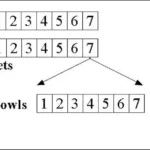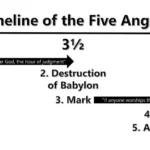Last Updated on December 6, 2024 by Steve
Augustine of Hippo
Augustine of Hippo (AD 354–430) also known as Saint Augustine, was a theologian, philosopher and the bishop of Hippo in North Africa. His writings greatly influenced Western Christianity and doctrine and many consider him to be the father of the Protestant Reformation. His most famous works include ‘The City of God’, ‘On Christian Doctrine’, and ‘Confessions’. Lesser known though is his 122 chapter manual on Christianity called the ‘Enchiridion on Faith, Hope and Love.’ (Enchiridion is Latin for manual or handbook). In chapter 38 he makes an incredible claim that is worth looking at in detail about how Jesus was conceived. The title of the chapter says it all…
“Jesus Christ, According to the Flesh, was not Born of the Holy Spirit in Such a Sense that the Holy Spirit is his Father.”1
Augustine asks some very pertinent questions and clearly sees a disconnect between the Holy Spirit’s role and the Father’s role in the conception of Jesus Christ. Here is an extract of chapter 38…
...in what sense do we say that Christ was born of the Holy Spirit, if the Holy Spirit did not beget Him?
...the puzzle is, in what sense it is said, "born of the Holy Ghost", when He is in no sense the Son of the Holy Ghost?
Incredibly what Augustine is saying is that the Holy Spirit was not Jesus’ Father–God the Father was the father of Jesus and Mary was His mother and so he comes to the conclusion that it was the Father who actually fathered Jesus….
It is clear beyond a doubt that He was not born of the Holy Spirit as His father...
The Greek grammar supports Augustine’s conclusion
So what are we saying here? Did the Holy Spirit have a role in the conception of Jesus in Mary’s womb? All of the English translations would appear to say so and that is what we have been led to believe for centuries in our church tradition.
But the thing is, I would contend that the Greek grammar agrees with Augustine on this point. Augustine was also a philosopher and this conundrum did not make sense to him. No wonder! And he was right, it doesn’t make sense. And I do think that the Word of God should make sense. But whereas Augustine didn’t use Greek grammar to support his logical conclusion, Greek grammar comes to his aid.
The definite article in Matthew chapter 1 is missing
The definite article (the) is not present in the Greek in Matt. 1:18, 20. The thing is you need to look up the Greek interlinear Bible to see this, not our English translations. All English translations put ‘the’ in because the way this passage has been understood is that it is the Holy Spirit who came upon Mary and is responsible for the immaculate conception. One of the very few translations that somewhat alludes to definite article not being there in the Greek by italicising is the Berean Literal Bible. In my own EDV translation I have accordingly translated v. 18 to bring this out as follows…
Now the birth of Jesus Christ was like this: His mother Mary was engaged to be married to Joseph. Before the two of them came together she was found to be with child by means of Holy Breath.
You’ll notice in my translation that Mary was found to be with child by means of Holy Breath not the Holy Breath! One might be tempted to think that that is a minor point. But think about this: Jesus was conceived by God’s Breath, the same breath which brought life to Adam in the Garden of Eden. In other words, the Father’s Breath. Just as God breathed into the first Adam, life, so the Father God breathed life into the second Adam, Jesus, in Mary’s womb. This makes total sense to me. The definite article is left out on purpose because it is not talking about the Holy Spirit but God’s Holy Breath. You might not see the difference but perhaps v. 20 might help.
The word order is also different in Matt. 1:20
But wait, there is more grammar to prove the point that Jesus was fathered by His Father alone and it is not to do with the missing definite article in v. 20 only but also the word order which is totally contrary to the way Bible translations have traditionally translated this. Here it is in mine to show you…
However while he was still thinking about this an angel of the Lord appeared to him in a dream saying, "Joseph, son of David. Do not be afraid to take Mary as your wife for that which has been begotten in her from God's Breath, is holy.
Do you notice the different word order as well as the missing definite article? It was only brought to my attention a couple of weeks ago and I was mind-blown by this. Why hasn’t someone told me this before I can hear you asking.
The Greek Interlinear Bible effectively says (paraphrasing) that the baby Jesus who has been conceived (or begotten) in her (Mary) from God’s (the Father’s) Breath is holy. In other words Jesus was holy or set apart, anointed right from conception. How true is that? It is not saying that Jesus was conceived by the Holy Spirit (Breath). That is a big difference in meaning. And this proves that Augustine was right some 1600 years ago when he wrote his Enchiridion on Faith, Hope and Love.
There is another grammatical point besides the missing definite article and the word order, though, and it is tied up with the meaning of the word ‘begotten’ in v. 20. According to the Greek Lexicon, ‘begotten’ (lemma: gennao) primarily means the male role in causing the conception and birth of a child and the issuing forth out of Himself.2
The definite article is definitely important
So the one doing the begetting has to be the Father not the Holy Spirit which makes total sense because Jesus is literally the Son of God, not the son of the Holy Spirit.
I am beginning to see that translators have become quite liberal in adding in the definite article when it is not there in the Greek. It is also quite prevalent in the Book of John. You can read my EDV translation to see the places where it shouldn’t be there because I have gone through every place methodically to try and be faithful with this. Do a search in my EDV such as ‘definite article’ to see where I have made comments in the footnotes regarding this. On many occasions it drastically changes the meaning such as John 8:33, 20:22, and Acts 2:4.
The inclusion or the omission of the definite article (the) is so important in our translations and Bible translators have, I believe, ignored the importance of whether the definite article is present or not. Rather in many cases they have assumed that it should be there and changed the translation to match their beliefs. Sometimes translators have done the right thing such as J.B. Philips in his translation of John 20:22. But certainly there is no consistency at all. Bible translators have been consistently inconsistent when it comes to the definite article.

Conclusion
Finally, another important point in doing good exegesis is to not only consider the grammar but to take into account what the early church fathers believed and wrote about considering that they were that much closer to the origins of the church. And on this point Bishop Augustine of Hippo, in my opinion, was right.
Another controversial issue is not only how Jesus was conceived but when He was born. The Bible gives a huge hint in Rev. 12:1 as to when He was born. To find out further info on this, read the post, Jesus was born on September 11th. This is by far my most popular post on the internet.
- https://biblehub.com/library/augustine/the_enchiridion/chapter_38_jesus_christ_according_to.htm [↩]
- Louw & Nida Greek Lexicon of the NT, 23.58 [↩]
















